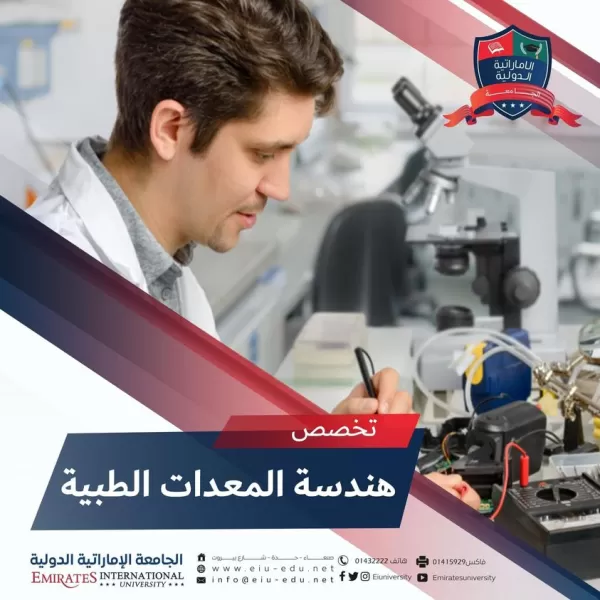
Medical Equipment Engineering.
What is medical equipment engineering or biomedical engineering? Biomedical engineers combine engineering principles with the medical and biological sciences to design and create equipment, devices, computer systems, and software used in health care. The demand for biomedical or medical equipment engineers has increased as the general society shifts towards the daily use of machines and technology in all aspects of life. Biomedical engineering is one of the latest engineering sciences that arose with the development of modern medicine. After the doctor was alone in performing all the tasks of diagnosis, treatment and even drug manufacture, the medical device became an essential companion for the doctor in diagnosis, treatment and patient monitoring, and due to the urgent need to develop medical devices and equipment including It serves the health of patients and the speed of their recovery, so specialists from fields other than medicine had to intervene to design these devices, such as electrical and mechanical engineers, computer engineers and others. These engineers also had to be familiar with the medical sciences, such as the anatomy and physiology of the human body, and so on, to understand the working mechanism of each system in it and to harness their knowledge and specialization in what develops these devices, and thus the need arose for an engineer with partial knowledge of all these specialties on the one hand and who could deal with doctors on the one hand. other, while noting that it is not a substitute for any of them. Duration of study specialization: The Biomedical Engineering or Medical Equipment Engineering program at Emirates International University extends for four years divided into eight semesters in which the student studies: Foundations of medical sciences. Fundamentals of electrical and electronics engineering. Foundations of computer science. - Familiarity with the installation and operation of medical devices and training to acquire the skills of operating and using medical devices and equipment and how to maintain and repair them. Understand the basics of marketing, sales and management. Areas of Specialization in Biomedical Engineering: The following are examples of areas of specialization within the biomedical engineering field: Bioinstrumentation Biometrics uses principles of electronics, computer science, and measurement to develop tools for diagnosing and treating medical problems. - Biomaterials: is the study of materials that occur naturally or in laboratories that are used in medical devices or as culture material. Biomechanics: Biomechanics involves the study of mechanics, such as thermodynamics, to solve biological or medical problems. Clinical Engineering: Clinical engineering applies medical technology to improve health care delivery. Rehabilitation engineering is the study of engineering and computer science to develop devices that help individuals recover from or adapt to physical and cognitive impairments. Systems Physiology: Systems physiology uses engineering tools to understand how systems within organisms, from bacteria to humans, function and react to changes in their environment. Bachelor's degree programs in Biomedical Engineering focus on engineering and biological sciences. Programs include theoretical and practical courses in topics such as fluid and solid mechanics, computer programming, circuit design, medical devices, physiology, biomaterials, application of computers in medicine, and medical imaging. The program also includes internships with hospitals, medical device companies, and the pharmaceutical industry, to provide students with practical applications as part of their studies. Educational objectives of the Biomedical Engineering or Medical Equipment Engineering program: The educational objectives of the Biomedical Engineering program is to provide students with knowledge about how to apply their basic engineering skills to solving problems in medicine and biology. Graduating biomedical engineers or medical equipment engineers with the knowledge and skills that enable them to deal efficiently with complex diagnostic and therapeutic devices in order to improve and develop health care. Responsibilities of Medical Equipment/Biomedical Engineers: Biomedical engineers typically do the following: Design of biomedical equipment and devices, such as artificial internal organs, replacements for body parts, and machines for diagnosing medical problems - Install, adjust, maintain, repair or provide technical support for vital medical equipment Evaluate the safety, efficiency, and effectiveness of biomedical equipment Designing electrical circuits or software to operate medical equipment or computer simulations to test new drug treatments Training of doctors and other staff on the proper use of vital medical equipment Research the engineering aspects of human and animal biological systems with life scientists, chemists and medical scientists Forensic engineers design tools, hardware, and software used in healthcare; development of new procedures using knowledge from many technical sources; Or conduct research necessary to solve clinical problems. They often work in research and development or quality assurance. Fields of work for medical equipment engineers: Companies supplying and distributing medical devices, hospitals and dispensaries, and electronic and medical devices repair workshops. Organizations and companies engaged in the design, development and use of medical equipment, devices, and materials, as well as those engaged in the maintenance and control of complex medical systems while working in hospitals. Huge job opportunities in the fields of medical equipment manufacturing, orthopedic engineering and rehabilitation. To provide valuable advice on the condition of medical equipment in hospitals. Medical equipment engineers can also employ themselves in research activities by working in concert with physicians in the fields of computational mechanics, physiology, medicine and high-tech innovation. - t
